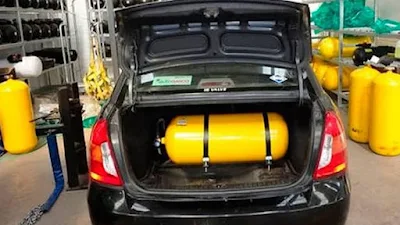Key Features of CNG-Powered Vehicles:
1. Eco-Friendly: CNG burns cleaner than gasoline or diesel, producing fewer pollutants and greenhouse gases like carbon dioxide (CO₂), nitrogen oxides (NOx), and particulate matter. It helps reduce a vehicle's environmental impact.
2. Cost-Effective: CNG is generally cheaper than gasoline or diesel, which can lead to significant savings on fuel costs, especially in regions where CNG is widely available.
3. Engine Modification: For a car to run on CNG, its engine needs to be modified or a CNG kit must be installed. This includes a high-pressure storage cylinder to hold the compressed gas, a pressure regulator, and injectors.
4. Fuel Storage: CNG is stored in pressurized tanks in the vehicle, usually in the trunk or undercarriage. The storage capacity is typically less than gasoline, meaning CNG vehicles often have a shorter driving range on a full tank compared to gasoline-powered vehicles.
5. Dual-Fuel Capability: Some vehicles are equipped with both CNG and gasoline tanks, allowing drivers to switch between fuels. This provides flexibility, especially when CNG refueling stations are not readily available.
CNG vehicles are popular in many parts of the world due to their lower emissions and cost savings, especially in countries where CNG infrastructure is well-developed.
Before converting your car to a CNG (Compressed Natural Gas) powered vehicle, there are several important factors to consider:
1. Vehicle Compatibility: Not all cars are suitable for CNG conversion. Ensure your vehicle's engine is compatible with a CNG kit. Generally, cars with petrol engines are easier to convert, but it's important to consult with a professional mechanic or manufacturer to verify compatibility.
2. Cost of Conversion: The upfront cost of converting a vehicle to CNG can be significant. The price typically includes the CNG kit, installation charges, and any necessary modifications to the car. Evaluate whether the long-term fuel savings will justify the initial expense.
3. Availability of CNG Stations: Check the availability of CNG refueling stations in your area. If CNG stations are scarce or far from your regular routes, refueling could become inconvenient.
4. Impact on Performance: CNG can affect your vehicle's performance, particularly in terms of power and acceleration. Although CNG is more fuel-efficient and eco-friendly, it may slightly reduce engine performance compared to gasoline or diesel.
5. Safety and Maintenance: CNG vehicles require regular inspections and maintenance, particularly for the CNG tank and fuel lines, to ensure safety. The system operates under high pressure, and any leaks or malfunctions can pose safety risks. Choose a certified technician for installation and follow recommended maintenance schedules.


